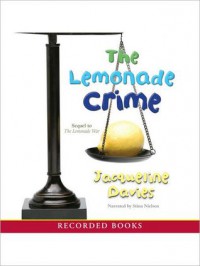Familiar Diversions
I'm a librarian who loves anime, manga, and reading a wide variety of genres.
Currently reading
The Lemonade Crime (audiobook) by Jacqueline Davies, narrated by Stina Nielson

Evan and his little sister Jessie are both in the fourth grade, not because they're twins, but rather because Jessie skipped a grade. Jessie is particularly good at math, very focused, feels strongly that things should be fair, and believes that rules are meant to be followed.
When one of their classmates, Scott, announces that he now owns a fancy new Xbox 2020, Evan sees red. He knows exactly where Scott got the money for it - Scott stole that money, over two hundred dollars, from Evan's shorts when they were swimming at a friend's house. Evan doesn't have any proof that Scott did it, but it's the only explanation. Then Jessie comes up with a plan: she's going to bring the truth to light in a court of law created by her and her classmates.
I checked this out from my library's Overdrive without realizing that the library owned the first book in audio as well, or I'd have started with the first book instead. It looks like I'll be listening to this series out of order.
And I do plan on listening to the first book. I enjoyed this second book in the series more than I expected to, considering that Middle Grade fiction usually reads too young for me (yes, I know that's the point - I'm not the intended audience for these books and I realize that). Jessie and Evan were great characters, both flawed in their own ways but still good kids.
Jessie didn't quite feel like she fit in. I sympathized with her trouble figuring out where to hang out during recess (or was it lunch? I can't remember). The way she really got into her courtroom plan reminded me a bit of myself. I could imagine her tossing and turning in bed, unable to stop thinking about all the things she still needed to do before the trial. She'd taken on the responsibility of both setting up as realistic a trial as possible and acting as Evan's lawyer.
Evan was really into basketball and had a bit of a crush on one of his classmates, Megan, who was also his sister's friend. I hated the way Evan acted in one particular scene, but the good thing was that he hated how he'd acted too, once it was all over, and took the time to try to do something about it.
This ended in a way that was more peaceful and friendly than I expected, and I liked the layers it added to the characters.
One nice detail: each chapter began with a definition of a term or phrase relating to courtroom proceedings (for example, "perjury"). Usually it was something illustrated by a character's words or actions in that particular chapter.
(Original review posted on A Library Girl's Familiar Diversions.)












